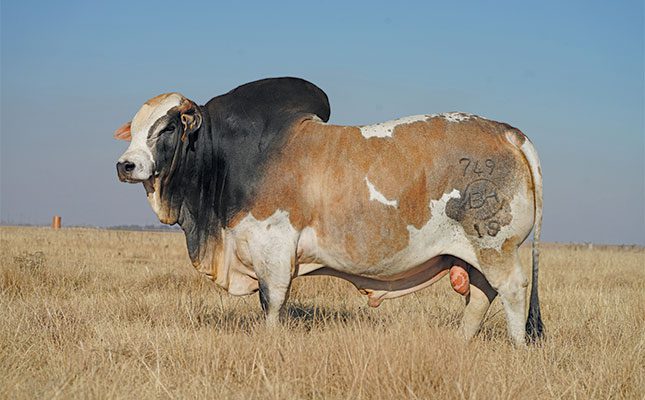The Boran breed has recently become a hot topic in agricultural circles, following the record-breaking sale of the bull BH 18 749 Cyclone to Zimbabwean farmer Collen Tafireyi. The bull was purchased for a staggering R8 million at the Hurwitz Farming 10th Production Auction in August 2024. Tafireyi expressed his excitement, stating, “Cyclone is set to play a crucial role in our breeding plans. We aim to breed the best Borans in Zimbabwe and put the country on the map.”
Tafireyi’s praise for Cyclone highlights the exceptional breeding behind the bull, which can be attributed to Simeon and Jarren Hurwitz, the brothers behind Hurwitz Farming. While the Boran breed is now gaining recognition, there was a time when it was in decline, with farmers struggling to sell their Borans, often below slaughter prices, just to get rid of them.
“We remained loyal to the breed, even when others doubted our investment in Borans,” recalls Simeon Hurwitz.
This dedication has clearly paid off, with the Hurwitz brothers now firmly established as key figures in the South African Boran industry. Their journey, however, has not been without its challenges.
**The Beginning of Hurwitz Farming**
In 2009, Simeon and Jarren Hurwitz took over their grandfather Dr. Barney Hurwitz’s farm in Bethal, Mpumalanga. Dr. Hurwitz, a pioneer of the Boran breed in South Africa, began importing Boran embryos from Zambia in 1995, several years before the Boran Cattle Breeders’ Society of South Africa was founded.
Their connection to the breed is deeply rooted in family history. Simeon and Jarren’s grandmother’s sister, Reeva, married into a farming family, and over time, several members of the family found themselves involved in farming. After facing financial struggles, Reeva’s son, Evan, and his friend Shaun Morris began researching cattle breeds suited to South African conditions, leading them to the Boran.
When Simeon and Jarren took over the farm, they had a herd of just 10 to 15 unregistered Borans, and their farming experience was minimal. They initially ran multiple cattle breeds, including Brahman, Simmentaler, Santa Gertrudis, Simbra, and Boran, but soon realized the inefficiency of managing such a diverse range. The decision was made to focus solely on the Boran.
**A Tough Decision**
Despite early struggles, including a significant drop in the Boran’s popularity, the Hurwitz brothers stuck with the breed. At one point, Boran prices plummeted so low that in-calf heifers were being sold for R7,000 to R8,000—below slaughter value. Nevertheless, Simeon and Jarren persevered, recognizing the inherent value of the Boran’s genetics.
“We knew the genetics were valuable, even if the market didn’t see it,” says Simeon. Over time, the breed’s benefits became clear: Borans are highly tick-resistant, easy to maintain, and possess remarkable mothering abilities. Their strong herding instinct and adaptability to harsh conditions, including stock theft prevention, further set them apart.
**The Rise of Hurwitz Farming**
By sticking to their vision, Simeon and Jarren began to see their hard work pay off. Borans, once undervalued, are now in high demand due to their resilience, fertility, and ease of handling. The Hurwitz brothers’ investment in high-quality genetics and embryo flushing programs has resulted in a herd of exceptional animals, such as Cyclone.
Cyclone’s sale for R8 million, along with the sale of other top-quality animals like BH 18 545 Jasmine, which sold for a record R2.5 million at the Hurwitz Farming Summer Sale, has drawn attention to the breed’s quality. Tafireyi, who bought Jasmine as well, believes the Hurwitz genetics will help elevate the Boran industry in Zimbabwe.
**Expanding Horizons**
Simeon and Jarren’s commitment to the breed goes beyond breeding; they have significantly contributed to marketing and promoting the Boran. Through professional photography, video marketing, and the construction of The Bull Ring—an innovative auction venue—they have raised awareness of the breed’s superior qualities.
While the sale of Cyclone to Zimbabwe has sparked some concern among South African farmers, Simeon is optimistic. “Boran genetics are in demand worldwide, and although Cyclone is no longer in South Africa, his genetics remain here through his progeny,” he says. This global interest in South African Borans only enhances the breed’s reputation.
**Diversification and Innovation**
In addition to Borans, Hurwitz Farming also manages Droughtmaster, Dexter, and Ankole herds. The Droughtmaster was introduced to diversify the farm’s operations and has since grown significantly. The brothers also run a silage contracting business, which has expanded due to their innovative approach to silage production, learned from a trip to Germany.
Despite challenges such as drought and theft, Simeon and Jarren remain optimistic about the future of the Boran breed in South Africa. Their forward-thinking approach, combined with their dedication to high-quality genetics, positions them as leaders in the cattle farming industry.
**Looking Ahead**
As Hurwitz Farming continues to grow, so too does the Boran breed’s reputation. With their unique combination of business acumen, innovation, and passion for the breed, Simeon and Jarren Hurwitz are not only shaping the future of their farm but also helping to put South African Borans on the global map.



